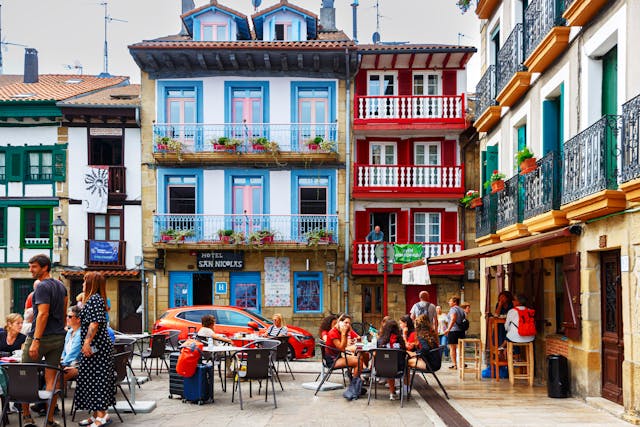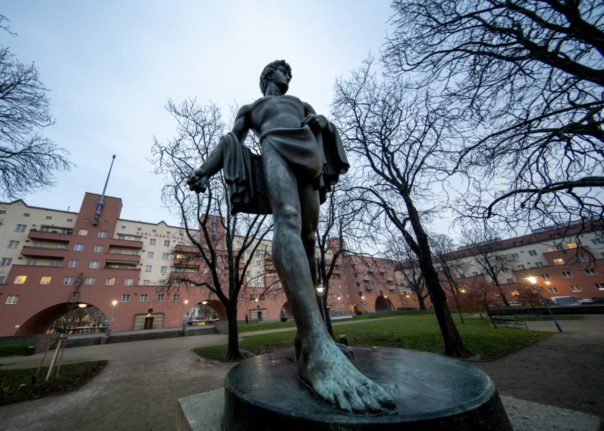In recent years several regions around Spain have attempted to put limits on foreigners buying homes and clamped down on tourist rentals. These are mainly in areas traditionally popular with foreigners, and many have become places with highly inflationary property markets.
In 2022 Canary nationalist political party Nueva Canarias demanded the regional government address the large number of property purchases by non-residents in the archipelago, and even suggested a limit on the number of properties that can be bought by foreigners altogether in the popular holiday islands.
READ ALSO: Will Spain’s Canary Islands limit sale of properties to foreigners?
Property prices have surged across Spain in recent years, sparked in part by an influx of post-pandemic purchases by foreigners, as well as tourist accommodation geared towards wealthy remote workers and digital nomads pushing up rental prices and pricing out locals. Increasingly, landlords will buy properties with the aim of converting them into Airbnbs, thus removing them from the pool of available (and affordable) housing stock for locals.
This comes after Spain’s other archipelago, the Balearic Islands, also started this same debate in November 2022, with the regional Senate agreeing to discuss solutions.
In the two decades from 2000-2020, the islands’ population grew by 50 percent – rising from 823,000 to 1,223,000 inhabitants. Around a third (32.67 percent) of property purchases in the Balearics are made by foreigners, and of those 57.4 percent are residents, while the remaining 42.6 percent are non-residents.
National ban?
But it’s not just a regional issue. In 2024, the debate rumbles on in parts of Spain particularly affected by foreign home owners and members of the Spanish government are even proposing similar measures at a national level. Though, it should be said, no policy has been decided on yet, and any move such as a ban (in whatever form, on whatever type of property) or even a limit would likely face fierce opposition from the main opposition parties, notably the centre-right Partido Popular (PP).
Sumar, the far-left junior coalition partner in the Spanish government, has even gone as far as proposing a three year ban on the purchase of housing by investment funds and non-residents in Spain.
This was recently outlined in a (for now) non-legislative proposal that was presented to the Spanish Congress’ Housing Commission. It was roundly rejected with the vote of, among others, its coalition partner in government, the Socialists (PSOE). That’s not to say the PSOE is totally against the idea, however.
Socialist Minister for Housing Isabel María Pérez said of the plans: “We agree on the philosophy of the proposal, but with nuances,” she said. “We have submitted an amendment but we think it will not be accepted, so we will not be able to support this bill,” she added.
So, from that we can take that the junior partner in the Spanish government wants to ban non-residents and investment funds from buying property in Spain, and the senior partner (Prime Minister Pedro Sánchez’s party, no less) supports the principle but not the practicalities.
READ ALSO: Spain’s new housing minister vows to protect second homeowners
The argument against
Clearly, non-resident foreigners buying up property in Spain, particularly in its space starved archipelagos, contributes to price inflation, saturates the market, and plays a role in pricing locals out of their own neighbourhoods.
However, it’s not that simple. Clearly, there is a difference between a non-resident foreigner buying a holiday home (perhaps to rent out as tourist accommodation for half the year) and a resident foreigner buying property to live in.
READ ALSO: How important are foreign second homeowners to Spain?
This difference has, for now, been reflected in proposed limits at both the regional and national level, rather than outright bans.
However, foreign home owners in Spain also make a huge contribution to the Spanish economy. In 2022 foreigners with a second home in Spain contributed €6.35 billion to Spanish GDP and generated more than 105,000 jobs in the tourism sector, according to the study “The economic impact of residential tourism in Spain” done for the Spanish Association of Developers and Builders (APCE) by PricewaterhouseCoopers (PwC).
The financial contribution made by these second-home owners in Spain is clearly significant. In fact, experts point out that the money brought into the Spanish coffers by foreign homeowners even outstrips some major industries.
“The contribution of residential tourism to GDP is triple that of the textile industry, double that of the timber industry and the same as the manufacture of pharmaceutical products in Spain,” Anna Merino, director of the Economics team at PwC, said when presenting the study. Every euro spent by ‘residential tourists’ adds €2.34 to Spanish GDP. On top of this direct contribution to the Spanish economy, the surrounding economic activity associated with the spending generated 105,600 full-time jobs in 2022.
So, there’s clearly an economic argument against banning foreign property purchases completely.
In the case of the Balearic Islands specifically, the proposals have met some opposition. The Balearics, which generates 35 percent of its GDP from tourism, according to figures from Caixa Bank, has long been a holiday or second-home hub for wealthy foreigners.
On this point, right-wing Popular Party member Sebastià Sagreras suggested in the regional parliament back in 2022 that conflating the foreign-buyer property market with local shortages is unhelpful, adding that the properties bought by foreigners, often worth more than a million euros, “do not compete” with those that cost €200,000 or €250,000 and are largely bought or rented by national residents.
Is it even legally possible?
Denmark, Malta and the Aland Islands in Finland all have restrictions on how non-resident foreigners can buy properties in their territories. However, they introduced these before entering the EU and these limits were factored in and accepted by Brussels. For Spain to do this, it would be much more difficult.
For local authorities in both the Balearic and the Canary Islands it could prove difficult to go against the EU’s legal principles of the free movement of people and capital, experts say.
This means that other potential solutions may be needed. Though there doesn’t seem to be a national level ban on foreigners from buying properties in Spain anytime soon, several regions have been attempting to do it for a couple of years, at least for non-residents, and even the national government is beginning to try and do something about it.



 Please whitelist us to continue reading.
Please whitelist us to continue reading.
Member comments